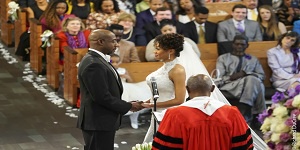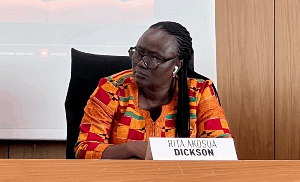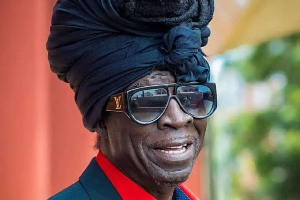IT could have been the most glamourous and well-attended church wedding, but after all the glitz and glamour, the event may not be legally recognised.
Why? The officiating pastor and the church premises must have been legally authorised to conduct the marriage, otherwise the event could, at best, pass for a mere gathering of family and friends.
A marriage is deemed null and void when the marriage celebration is conducted in an unregistered church premise and /or officiated by the pastor who has not licensed and gazetted.
Where a marriage is celebrated in a licensed church by a licensed pastor but the parties fail to give notice and sign the marriage register under the provisions of the marriage ordinance, that marriage will at best be a church blessing of a customary marriage
A worrying trend however, is that many unregistered churches and pastors are conducting illegal marriages in the country.
According to Yaw Twumasi – Ankrah, Legal Officer /registrar of Marriages at the Accra Metropolitan Assembly, some of the churches go to the extent of printing their own marriage certificates for their members instead of applying for them from the Registrar General’s Department.
“Infact the danger is that a lot of marriages that has already taken place, may not be marriages at all in law”, he said.
According to him, the churches in their quest to please their members and not wanting to lose them, hid the truth about their inability to conduct marriages from them.
The result is that they conduct these marriages for their innocent members who would only realise years later that they were not legally married after they end up in court on anything concerning the marriage.
Types of legal marriages in Ghana
In accordance with the Marriages Act, 1884-1985 (CAP 127) there are three types of marriages in Ghana; namely, the Islamic Marriage, Customary law marriage and the Christian Marriage.
Types of Licences under the Ordinance Marriages
Mrs Jemima Oware, Principal Registrar of Marriages in statement explained the three types of Licences under the Ordinance Marriages namely; The Registrar’s Certificate which is issued under the sole authority of the Municipal and Metropolitan Assemblies.
The Marriage Officers Certificate issued under the authority of churches and religious institutions which must also have licensed pastors gazetted by the Registrar-General and Ministry of Justice to officiate such marriages and thirdly, The Special Licence issued under the Ordinance Marriage.This third type of marriage which is officiated under a Special Licence according to the statement is the sole prerogative of the Principal Registrar of Marriages who is also the Registrar-General.
With the Special Licence, the representative of the Principal Registrar of Marriages under a Special Licence is able to officiate marriages in any unlicensed premises and also demands that the marriage be solemnised within 20 working days in a licensed premises or at any unlicensed place unlike the marriage under the Registrar’s Certificate, where the Marriage is supposed to be officiated at the Assembly premises and should also be officiated within three months after the 21 day notice. If for any reason this is not done, the whole process has to be commenced all over again.
The Principal Registrar of Marriages insists that “Where the Officiating Minister is not gazetted and the venue is not licensed, the position of the law is that such marriages are void ab initio, that is, such a marriage is invalid under section 74 of the Marriages Act”.
A reference case
A test case curled from Graphiconline.com on the subject and often referred to by marriage legal experts is the case of APPOMASU v. BREMAWUO AND ANOTHER [1980] GLR 278 W. H.,
In the case of APPOMASU v. BREMAWUO AND ANOTHER [1980] GLR 278 W. H., previously married under the customary law, decided to go through a marriage ceremony at the Roman Catholic
Church Cathedral, Kumasi, in order to have their marriage by the church, and also to be able to receive Holy Communion administered by the church.
There was no evidence that the ceremony complied with the mandatory provisions of the Marriage Ordinance, Cap. 127 (1951 Rev.), s. 31.
Besides, the only recorded evidence concerning the marriage was an entry in the official register of the church. On the death intestate of H., W. applied for letters of administration, asserting that the ceremony which took place between her and H. had converted the customary marriage into an ordinance marriage.
This was, however, disputed by the customary successor of H., who in turn alleged that the marriage was merely a nuptial blessing of the customary marriage.
The Court of Appeal held that from the evidence, W and H intended to celebrate a marriage which conformed with the rites of the Catholic Church and which would also enable them to qualify for admission to the holy communion administered by the church.
That the legal effect of the church ceremony did not constitute a marriage under the Marriage Ordinance but a marriage blessed by the church.
The court further found that on W.'s own showing they did not deliver to the reverend father either a registrar's certificate or two marriage officer's certificates as required by section 31 of the marriage ordinance, Cap. 127; neither were they asked to sign a marriage certificate nor was a certificate given to them as required by section 34 and 35 of Cap. 127.
Therefore the ceremony performed at St. Peter's Cathedral between W. and H. was not a marriage under the ordinance.
It is clear that any celebration of marriage by a pastor in a church, which does not comply with the requirements of the law, will at best remain a church blessing and will disable the parties from taking advantage of the rights and benefits accruing to couples married under the Marriage Ordinance.
Religion of Friday, 9 September 2016
Source: thefinderonline.com















